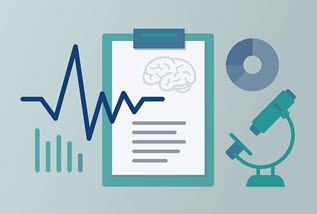
Prevention
Reduce risks and symptoms with lifestyle changes
Research suggests that healthy lifestyle changes can alter the course of cognitive decline, and it's never too late to start. Combined with testing to identify genetic risk and to establish baseline blood markers of disease, strategic behavioral changes may help to slow or prevent the progress and impacts of Alzheimer's and other neurological conditions.
Sign up to receive exclusive news and lifestyle tips that may help to slow cognitive decline.
Nutrition
Research shows that adoption of a heart-healthy and antioxidant-rich eating program such as the Mediterranean diet may help reduce brain inflammation, inhibit beta-amyloid deposits, and improve cellular metabolism in ways that protect against disease. There is also evidence to suggest that healthy eating's positive impact on cardiovascular health in turn reduces dementia risk.
A Mediterranean diet emphasizes whole grains, fruits, vegetables, fish and shellfish, and healthy fats from nuts and olive oil. A variation of the Mediterranean diet called MIND (Mediterranean–DASH Intervention for Neurodegenerative Delay) additionally limits sugar and sodium, and has been shown to lower high blood pressure, which is a risk factor for Alzheimer’s disease. Two recent studies(1,2) suggest that the diet’s emphasis on fish may also be a strong factor influencing higher cognitive function and slower neurodegeneration.
Additionally, there is evidence to suggest that vitamin D deficiency may impact cognitive decline. Speak with you doctor about nutritional changes or adding a supplement.
The MIND Diet
The MIND diet focuses on plant-based foods linked to dementia prevention. It encourages eating from 10 healthy food groups:
-
leafy green vegetables, at least 6 servings/week
-
other vegetables, at least 1 serving/day
-
berries, at least 2 servings/week
-
whole grains, at least 3 servings/day
-
fish, 1 serving/week
-
poultry, 2 servings/week
-
beans, 3 servings/week
-
nuts, 5 servings/week
-
wine, 1 glass/day
-
olive oil
The MIND diet limits red meat, sweets, cheese, butter/margarine and fast/fried food.
Source: National Institute on Aging

Exercise
Several studies have found an association between physical activity and reduced risk of cognitive decline. Exercise elevates your heart rate and increases blood flow, stimulating chemical changes in the brain that enhance memory, learning, and neuroplasticity. It also appears to provide physical benefits to the brain, including increasing the thickness of the cerebral cortex and improving the integrity of nerve fibers.
Even a moderate amount of exercise appears to benefit the brain. One recent study concluded that an hour of light-intensity physical activity equivalent to achieving 7,500 steps daily was associated with higher total brain volume. The benefits slowed brain aging by approximately 1.4 to 2.2 years.
Stay Physically Active
Any physical activity can benefit your brain, but regular activity in three areas will improve blood flow and keep your body and brain in top shape.
Guidelines recommend:
Aerobic activity 150 minutes per week (30 min a day, 5 days/week) of moderate-intensity aerobic activity such as walking, jogging, biking, dancing, or swimming
Strength training 2 sessions per week of planks, light weights and/or squats
Flexibility/balance 2-3 sessions per week of yoga, tai chi or pilates

Sleep
Sleep may help reduce the buildup of proteins associated with Alzheimer’s disease, and also keeps your immune system healthy. Insufficient sleep due to conditions like insomnia or sleep apnea may result in problems with memory and thinking.
Research has shown that poor sleep patterns, such as difficulty falling asleep or staying asleep, are also associated with an increased risk of Alzheimer's disease.
Promote Better Sleep
-
Treat underlying conditions Among other treatable conditions, depression, sleep apnea, and restless legs syndrome cause sleep problems.
-
Establish a routine Maintain regular times for eating, waking up, and going to bed.
-
Avoid stimulants Alcohol, caffeine, and nicotine can interfere with sleep. Limit use, especially at night. Also, avoid TV during periods of wakefulness at night.
-
Engage in physical activity Exercise and stretching can help promote better sleep at night.
-
Mind your environment A cool, dark, quiet sleep environment promotes better sleep. Black-out shades, an eye mask, white noise machine, and cool thermostat setting can all help.

Rigorous Intellectual Activity
A number of studies indicate that maintaining strong social connections and keeping mentally active as we age might lower the risk of cognitive decline and Alzheimer's. Experts are not certain about the reasons, but social and mental stimulation appear to strengthen connections between nerve cells in the brain.
Challenging your mind may have both short and long-term benefits for your brain. Regular engagement with brain-stimulating hobbies has been shown to improve thinking and reasoning skills.
Activate Your Mind
-
Read books and newspapers
-
Take a class
-
Enjoy strategic and challenging puzzles and games
-
Play bridge or board games with friends or grandkids
-
Learn another language or take up a musical instrument

Other Lifestyle Habits
Heart Health + Diabetes
Evidence shows that risk factors for cardiovascular disease and stroke—including obesity, hypertension, and diabetes—negatively impact cognitive health. If you have high blood pressure or diabetes, work with your doctor to develop a personalized plan to address them, including with nutrition, exercise, and possibly medication.
Smoking
Studies indicate that smoking increases risk of cognitive decline. Quitting smoking can reduce risk to levels comparable to those who have never smoked.
Head Trauma
Brain injuries can raise your risk of cognitive decline and dementia. Take steps to prevent falls by incorporating balance exercises into your routine, decreasing clutter, providing visual cues near obstacles, and keeping walking paths clear inside your home. Wear a seat belt, use a helmet when playing contact sports or riding a bike, and secure adequate lighting.
Regular Medical Care
Not all cognitive decline results from neurodegenerative disease or brain injury. Cognitive function can be negatively impacted by such treatable conditions as vitamin B12 deficiency, sleep apnea, thyroid problems, and even certain types of brain infections. Receiving regular medical care to treat (or rule out) these and other underlying conditions is a key part of cognitive health maintenance.
Social Engagement
Maintaining a robust social life and avoiding isolation supports brain health. Social engagement requires you to interpret verbal and visual cues and respond to them accordingly. It can also improve mood and potentially ward off depression, which can have adverse effects on cognition.
Find ways to stay social in your community through volunteering at a local hospital or charitable group. Schedule regular get-togethers with friends and family or join a social organization.
*SUPPLEMENTS
While only anecdotal evidence is available, many people have reported short-term benefits from memory-support dietary supplements. The apparent boost in brain function may be a placebo effect. Regular blood biomarker testing can objectively assess the efficacy of supplements and/or lifestyle changes. BrainHealth also allows you to opt in to anonymous data pooling, which helps to advance research in Alzheimer's and other neurodegenerative conditions. BrainHealth does not sell or promote use of supplements.








